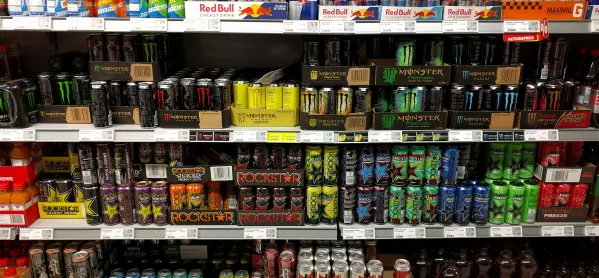Children in England are to be banned from buying energy drinks under government plans.
A 12-week consultation period will hear a range of views about how the ban should be best applied, and could either extend to under-16s or under-18s.
It will involve drinks with more than 150mg of caffeine per litre, including brands such as Red Bull, Monster, and Relentless.
Louise Martin, assistant principal at Harris Academy, South Norwood, London, in an article for Tes, says young people are addicted to energy drinks.
She says: “Like an increasing number of schools across the UK, we have successfully banned energy drinks.
“Why are our students consuming these highly caffeinated beverages like there is no tomorrow? Well, they’re cheap, often cheaper than water… and children as young as 10 are reportedly buying them to “fit in” or “look tough”.
“That’s the equivalent of a 10-year-old drinking three cups of coffee in one sitting. It’s truly unbelievable.
“These drinks also offer an immediate ‘hit’ and are readily available in supermarkets and corner shops across the country. Children of any age can go into a shop, purchase and gulp down with no questions asked, suffering miserable side effects such as headaches and heart palpitations.”
Concerns are also that children’s education is being harmed, with the drinks linked to behavioural issues and poor classroom discipline.
Many also have very high amounts of sugar, contributing to tooth decay and obesity.
Studies have shown that regularly consuming large quantities of caffeine can result in increased blood pressure, sleep disturbances, headaches and stomach aches.
Public health minister Steve Brine says British children consume an amount of energy drinks which is way above the European average, contributing to emotional difficulties and tiredness.
Meanwhile, government figures show that many major retailers already do not sell to under-16s, but only 21 per cent of the UK grocery market, including corner shops, are signed up to voluntary restrictions.
Nearly 70 per cent of UK children aged 10 to 17 years old consume energy drinks, according to the government’s childhood obesity plan.
Jenny Oldroyd, deputy director for obesity, food and nutrition at the Department of Health and Social Care, said: “Around a quarter of adolescents are consuming more than three energy drinks in one sitting, so it’s that high level of consumption that concerns us.”
UK energy drink sales jumped by 19 per cent between 2012 and 2017, with total sales estimated at £1.65bn last year, according to analysis from market researchers Mintel.
A further 10 per cent growth for the energy drinks market is expected in the period 2017-22, says Mintel.




